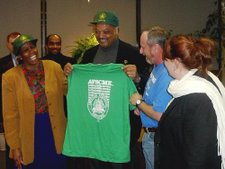
Last week,
President Bush vetoed bipartisan legislation to insure 10 million children.
Throughout the debate on the State Children’s Health Insurance Program (SCHIP), the president has, shall we say, stretched the facts about what the bill would do.
This angered Republican Sen. Chuck Grassley of Iowa, a leading supporter of the SCHIP bill, who said: "The president’s understanding of our bill is wrong."
A few weeks ago, Rep. John Boozman voted against the SCHIP bill. As the House prepares to vote again—this time to override the Bush veto--we need your help to make sure Rep. Boozman is better informed this time around.
Click here to send Rep. Boozman the facts on SCHIP.
Make sure Congress has no excuse to deny health care to millions of children.
The fact is, this is not a partisan bill. Large bipartisan majorities in both the House and Senate voted for it, and an overwhelming majority of Americans support its passage.
And ultimately, it’s about making an investment in our country’s future—our children. The legislation would continue health coverage for more than 6 million low-income children and extend coverage to an additional 4 million of America’s uninsured children.
Below are the facts about the SCHIP bill. (Remember to click here to send them to Rep. Boozman.)
FACT: The SCHIP bill would benefit low-income families. As Republican Sen. Orrin Hatch (R-Utah), a strong SCHIP supporter, said: “For those who argue that it’s out of control, 92 percent--no less than 91 percent, but really 92 percent of all the kids who will be covered by this bill--will be in families under 200 percent of the poverty level.” [Press Conference, 10/3/07]
FACT: No state currently covers children at $83,000 and the SCHIP reauthorization agreement does not raise the eligibility level to encourage states to cover families up to $83,000. The legislation targets funding to low-income children and actually reduces federal support for future coverage of children at higher income levels. There is nothing in the agreement that changes current law rules on interpretation and approval of appropriate income levels for eligibility above 200 percent of the federal poverty level. [H.R. 976, 2007]
FACT: The SCHIP compromise does not provide coverage to illegal immigrants. The bill reiterates current federal law, which prohibits coverage to illegal immigrants. The SCHIP compromise allows applicants to prove their citizenship by providing a Social Security Number (SSN). The Social Security Administration would then verify the SSNs against applicants’ names and citizenship status. [American Academy of Pediatrics]
FACT: The bipartisan SCHIP compromise combines the best of public and private approaches to provide health coverage to children. The State Children’s Health Insurance Program is not an entitlement program; rather, it is a capped block grant program for states. The program affords states great flexibility to offer coverage as they choose. The majority of SCHIP programs are modeled after private insurance and use private plans to deliver benefits. [H.R. 976, 2007; Center for Budget and Policy Priorities, 6/12/07]
Click here to make sure Rep. Boozman knows the facts before the House votes to override the Bush veto.
With your help, we can make sure millions of children get the health coverage they need.
http://www.unionvoice.org/campaign/schip_facts
 October 31, 1919 Little Rock attorney O.G. Bratton indicted for barratry in Helena for attempting to provide legal defense for “insolent" African-American cotton pickers and sawmill hands who were members of the Progressive Farmers' and Household Union; he was held thirty-one days without bond in Phillips County jail and then released without trial.
October 31, 1919 Little Rock attorney O.G. Bratton indicted for barratry in Helena for attempting to provide legal defense for “insolent" African-American cotton pickers and sawmill hands who were members of the Progressive Farmers' and Household Union; he was held thirty-one days without bond in Phillips County jail and then released without trial.



















